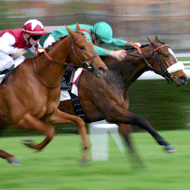Study brings fresh hope to horses with tendon injuries

Tendon injuries are the leading cause of retirement in horses.
Embryonic stem cells may give horses with tendon injuries a greater chance of recovery, according to new research.
The study, published in the journal Nature, used a laboratory model to show that adult tendon cells cannot produce ‘artificial tendons’ when exposed to inflammation.
Conversely, researchers found that embryonic stem cells that were directed to turn into tendon cells behaved as normal when exposed to inflammation.
The study was led by the Animal Health Trust and funded by the Horserace Betting Levy Board, Racing Foundation, Alice Noakes Memorial Charitable Trust and Beryl Evetts and Robert Luff Animal Welfare Trust.
“We were able to demonstrate that these tendon cells express different levels of receptors for inflammatory proteins on their surface,” explained Dr Debbie Guest, head of stem cell research at the AHT.
“This means that these stem cells may provide a useful source of cells for clinical transplantation into the injured tendon as they are unlikely to suffer any negative effects from being placed into an inflamed environment.”
Tendon injuries are the leading cause of retirement in horses. The early stages of tendon injury are usually accompanied by a significant increase in tissue inflammation, which is likely to contribute to poor tissue regeneration.
The AHT has secured funding for a follow-up study and the team are hopeful that new treatments for this common problem may soon be developed.



 The RCVS has announced a new version of its 1CPD mobile app, with enhanced features for veterinary surgeons and veterinary nurses to record their continuing professional development.
The RCVS has announced a new version of its 1CPD mobile app, with enhanced features for veterinary surgeons and veterinary nurses to record their continuing professional development.